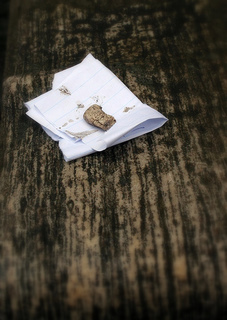Jewish Funeral Etiquette
~Respecting Tradition~
Jewish funeral etiquette is as rich as the Jewish traditions. It is a time of profound significance to the family and friends of the deceased.
Basic funeral etiquette is universal. It is a time of solemnity and grieving. It is also a time of celebration and remembering. This is the time when the family and friends can share in memories and love for the one they have lost.
Jewish customs are rich and involved with every aspect of life. As one who is attending a Jewish funeral, becoming familiar with these customs will enable you to understand what their ritual observances entail.
 Jewish Funeral Customs
Jewish Funeral Customs
~Shemira~ The
body is watched over from the time of death to the time of burial. This
is usually done by a family member who recites psalms during this time.~Taharah~ The preparing of the body for burial. During this the body is washed thoroughly with warm water. As it is washed it is never placed face down. The body is prepared by members of a sacred burial society with men preparing men and women preparing women. Prayers and psalms are recited throughout this process.
~Tachrichim~ The body is dressed in a white, simple shroud for burial. The reason behind this is to eliminate any distinction between rich and poor. Men are buried wearing a prayer shawl with one of the fringes has been removed. This renders the shawl unusable.
~Oron~ The casket is simple, made from wood only. It is not to have any metal parts. There are several holes drilled in the bottom so that the body may return to the dust.
~K'reeah~ As a symbol of anguish and grief, this is the rending of the outer garments. Mourners have traditionally rent their outer garments during this time.
Jewish Funeral Etiquette
In the Jewish culture, there are three parts to a funeral. Understanding the etiquette for funerals in this tradition will enable you to respect and mourn with the family and friends of the deceased. The parts are: the funeral, the burial and the Sitting Shiva.The Funeral
A traditional Jewish funeral is held within 48 hours from the time of death. They are usually held in a funeral home. In accordance to Jewish custom, there is no viewing as the casket is closed. During the funeral, the rabbi will speak, prayers will be offered (usually in Hebrew) and family members may offer eulogies.As a friend or family member, Jewish funeral etiquette is shown when you have reverence for the ceremony. Even if you do not understand all that is said and done, be respectful and maintain quiet dignity throughout the service. Wearing dark, conservative clothing is very appropriate. Do not wear open-toed shoes or anything of a casual nature.
The Burial
The graveside ceremony is reserved for the family of the deceased. If you are invited attend this part of the funeral, you may be asked to take part in the filling of the grave. This is done by filling the grave with three shovels of dirt. Cultural etiquette is shown by always pointing the shovel down and replacing it into the dirt when you are done. Do not hand the shovel to someone else. This is all symbolic to the Jewish traditions.The Sitting Shiva
This is when the community comes to pay their respects to the family. It is usually held during the week following the funeral and burial. Jewish funeral tradition states that during a shiva call it is appropriate to share a story or memory about the person. Doing so will help keep their loved one close and alive in their hearts. However, there are times when silence is best. The family is mostly appreciative of having you there.When making a shival call, do not bring flowers. It is not appropriate for Jewish funerals. It is appropriate, however, to bring kosher food for the family. During their time of mourning, they should not be burdened with preparing of food. Hot foods are the best, however any prepared food will be appropriate.
Also, in many cases the family will have chosen a charity for financial donations. This is a wonderful way to pay your respects to the family.
Please respect the family during this time of mourning and dress conservatively when calling upon them. This shows good manners.
Visiting the Grave
When visiting a Jewish grave you will notice that they are buried without a headstone. The headstone, usually very simple and plain, is added at a later date. As you visit, it is custom to place a rock on the headstone. You may also leave a note under the rock. This shows that the grave has been visited. Again, flowers are not appropriate in Jewish funeral etiquette.Understanding Jewish customs is a beautiful way to show your love and respect for the family of the deceased. The richness and beauty of their traditions is woven into every aspect of their live. What we have shared here is but a glimpse into Jewish funeral etiquette. We hope that it will help you express your grief with those you love.





